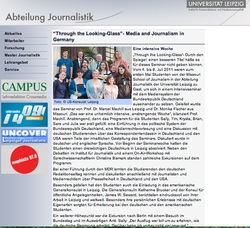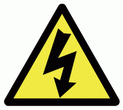
University of Missouri Journalism students studying abroad at Leipzig University (Germany) are doing big things. Check out the article below to learn more.
"'Through the Looking Glass' - Media and Journalism in Germany"
 University of Missouri Journalism students studying abroad at Leipzig University (Germany) are doing big things. Check out the article below to learn more. "'Through the Looking Glass' - Media and Journalism in Germany" Staying in a hostel is a great, affordable way for students to travel on the weekends and on breaks while studying abroad. Check out these bloggers' tips on how to find a good hostel:
How to Pick a Good HostelBudget Travel Indie Travel Podcast Find Cheap Student Hostels Here's a hint about these study abroad necessities that are sometimes overlooked: You can't see it, It's electric! You gotta feel it, It's electric! Ooh, it's shakin' It's electric! Horrible late-eighties-dance-craze music aside, we know that when students are about to leave to go abroad they have a million thoughts as to what to bring, what they’ll do there and so on. Although it might not be the most glamorous thing to think about when planning your trip, an important item for students to look into before they depart is what sort of electricity system that their destination country employs. This is important to find out not only ensure their appliances such as hair dryers, laptops and camera chargers work overseas, but also to ensure that these appliances do not get ruined. Study abroad advisors in our office have stories about students who return from their time abroad with much shorter hair due to trying to incorrectly use a blow dryer or flat iron abroad. So unless you think you’d like to get an accidental makeover while studying overseas, read on and we'll teach you, teach you, teach you, we'll teach you the electric guide. According to the foreignelectricityconverter.com, countries throughout the world use either a 110-120 or 220-240 volt electricity system. In North, Central and some parts of South America, a 110-120 system is used, while nearly everywhere else uses a 220-240 volt system. In order to use your electric appliances universally, you may need to purchase a converter and/or adapter depending on your destination. Check out the following sources to learn more and to verify what you will need to bring with you before you leave for each of the countries you plan to travel to:  Study abroad advisor Kip Kendrick recommends seeking out this information early and not waiting until the last minute to purchase a converter or an adapter as stores in Columbia tend to sell out before study abroad departures every semester.
As always, if you have any questions about what you should bring, feel free to shoot us a message, tweet or Facebook us! |
AboutFollow this blog to keep up with J-School Study Abroad. For more information visit MU Journalism Study Abroad.
Archives
February 2014
Categories
All
|
